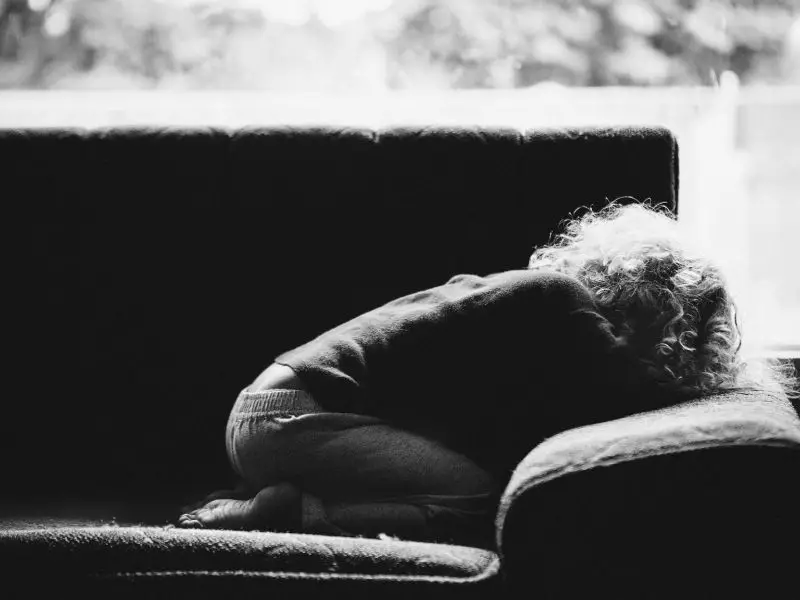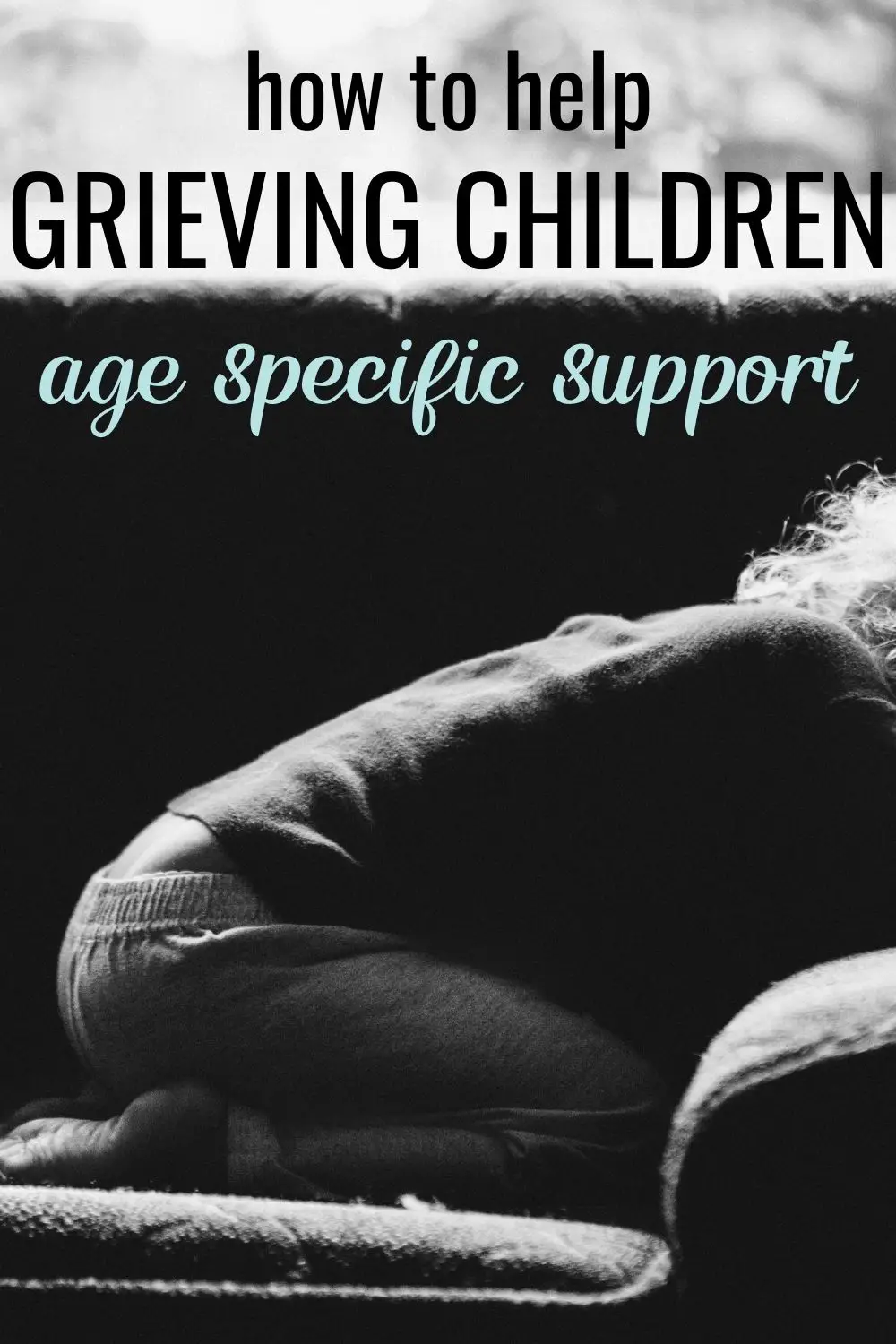Children of all ages grieve. They just do it in a different way than adults. They experience sadness, anger, guilt, fear, and anxiety. Even very young children can sense that the household is in turmoil and are affected by the tragedy in a very real sense. So, today we’ll look at how to help grieving children, by giving them age-specific support.

How To Help Grieving Children
How to help grieving toddlers (less than 3 years old)
The Invisible String Toddlers may sense a loss, may miss their deceased mother, but they cannot grasp the concept of death. They don’t understand the difference between a short absence and permanent loss.
Toddlers may sense a loss, may miss their deceased mother, but they cannot grasp the concept of death. They don’t understand the difference between a short absence and permanent loss.
Symptoms of grieving toddlers:
- frequent crying or acting out
- irritability or fussiness
- clinging to the caregiver
- changes in eating/sleeping habits
- regression to thumb-sucking or prior toileting habits
How to help:
- Try to maintain normal routines and familiar surroundings, as much as possible.
- Provide consistent caregivers who are able to provide plenty of loving care, including hugs.
- Give simple, consistent, and honest explanations regarding the death, appropriate to their level of understanding. Do not lie or use euphemisms. (“Mommy went to sleep”) Even toddlers must be told that “Mommy died and won’t be coming back”. Oh, so tough to do, but necessary.
How to help preschool children grieve (3-5 years old)
Preschoolers usually think death is temporary and reversible, merely a separation.
Symptoms of grieving preschoolers:
- ask again and again when Daddy is coming home
- show fear of being alone or may refuse to go to daycare
- act out, as they are not really able to express their emotions verbally yet
- throw temper tantrums and regress to more immature behavior
- they may even feel that their thoughts or feelings caused the death (magical thinking)
How to help:
- Explain death in simple and direct terms, providing only details they are able to comprehend. They think very literally, so don’t use euphemisms like “went to sleep” or “the angels took her”. Instead explain what really happened, that the body no longer works, and use the word “died” or “death”.
- You may need to repeat explanations over and over, as they often ask the same questions again and again.
- Make sure they understand they were in no way responsible for the death by their thoughts; “magical thinking”.
- Tell them they will not be abandoned but will continue to be loved and cared for.
- Strive to provide consistent and familiar caretakers and daily routines.
- Be patient with regressive behavior: it should be temporary and improve with time.
What grief looks like for middle childhood (6-9 years old)
Children at this stage may have a more clear idea of the concept of death, but they may still confuse death with sleep.
Symptoms of grieving 6 to 9-year-olds:
- they have no concrete understanding of the finality of death and find it hard to separate death from life
- often they see it as something that happens to old people
- they focus on how the death event impacts them, and they may fear for their own safety
How to help:
- Discuss the death, using the proper words “died” and “death”. Provide only simple explanations in response to their questions. Tell the truth but don’t overwhelm them with details they did not ask for.
- Acknowledge the importance of their feelings and encourage crying and other expressions of grief.
- Encourage discussion and let him know he can ask any questions at all and get honest answers from you (even about “unmentionables”).
- Let them participate in memorial or commemorative activities and projects whenever possible.
Helping grieving preteens (10-12 years old)
At the age of 9 or 10, children begin to fully understand the finality of death.
- They may worry about their own personal safety.
- The death scares them, as they have just started to understand their own mortality.
- They may have trouble concentrating and do poorly in school.
- Sometimes they will ask many specific questions about the death, the body, and/or bereavement rites and rituals.
How to help:
- Talk openly and honestly about the death and the body, providing specifics as they are asked for.
- Let them feel safe crying or expressing their grief to you. Share your own feelings of grief with them. It’s okay to cry with them.
- Encourage expressions of grief through journal-writing, art, poetry, and music.
- Let the child create his own plans for a memorial celebration or special planting, how he wants to say goodbye.
How to help teens grieve
Teenagers perceive death in much the same way adults do. However, they may:
- react in a dramatic manner, by misbehaving or acting out.
- engage in dangerous activities in an attempt to defy death.
- the teenage years are already hard on the child, without the added burden of significant grief. Teens may have suicidal thoughts and see death as a romantic thing.
Peer influence is so important at this age that teens may resent or feel embarrassed about death because it impacts their normal comfortable social life.
These stressors may lead a teen to feel “different” or isolated from their friends. Teens may deal with this by trying to distract themselves or by “turning off” their grief. They may act as if nothing has happened when in reality, they are torn up inside. It may be hard to draw teenagers out and get them to express their grief in a healthy manner.
How to help:
- Don’t force a teen to talk about death or grief, as they normally are reluctant to talk to adults.
- You may initiate a discussion by “going first” with how you feel about death.
- Talk openly and honestly about it, while letting her know that no subject is off-limits.
- Be a good, nonjudgmental listener. Acknowledging his grief without criticizing helps gain trust.
- Let her know it is perfectly normal to cry and feel extreme sadness, guilt, and regret.
- Contact bereavement support groups or a teen retreat if the child wants to participate. Peer group support can be most helpful for teenagers.
- Alternatively, encourage him to try a grief forum on the internet.
- Invite him to create a memorial commemorating the deceased.
- Artistic activities which may be very helpful for teens: creating memory boxes or quilts, journaling, writing poetry or songs, or scrapbooking.
- Watch carefully for any signs of serious suicidal tendencies or depression that worsens over time.


